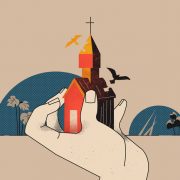6 Ways The Church Can Help Sexual Abuse Victims
Written By Gillian Chong, Malaysia
Gillian Chong is a counselor and the co-founder of Agape Vision, a non-governmental organization in Malaysia serving at-risk youths who have been abused and marginalized. Agape Vision empowers youths to be leaders through programs such as Expedition Agape Malaysia, in which youths lead community service projects both in Malaysia and overseas. Agape Vision is currently setting-up a residential treatment centre in Malaysia which will provide severely abused youths with a therapeutic milieu in a residential setting as well as professional therapies to support the youths’ healing from childhood abuse.
“Who’s going to believe me?” she asked wearily, her head cradled on one hand. She was seeing me for counselling after being sexually abused for many years by a pastor. We were processing her childhood experiences of sexual abuse at the hands of the man who first led her to our Savior, and her feelings of helplessness all those years. “He’s a pastor!” she cried out vehemently.
I nodded, my heart aching. In truth, her words echoed my own. “Who’s going to believe me?” For so many years, I asked the same question. First molested by a full-time church youth worker, and then seduced by a youth pastor—both women—I lived in a web of terror throughout the weeks and months of both experiences.
At the back of my mind was the cry, “Please, somebody help me!” Yet because same-sex relationships are so taboo in churches, I felt unable to voice out my plea for help. I thought nobody would ever believe me if I told them that the very leaders who were teaching us—about the sins of sex outside marriage and the importance of setting boundaries—were the ones touching me in ways that I felt unable to escape from.
I felt so alone. I thought there was surely something very wrong with me. I never thought that I would be a victim in the very place that I felt the safest.
A sexual abuse survivor’s journey to healing is a long and painful one—and it’s a journey we cannot walk alone. For me, my helplessness led me to spend more time with God and His Word, pouring out my deep hurt and betrayal to Him. I found that truly, “The Lord is close to the brokenhearted and saves those who are crushed in spirit” (Psalm 34:18). God understood the depth of my pain. He spoke to me in my times of anguish and reminded me that He would never leave me nor forsake me (Hebrews 13:5).
When I felt dirty, He assured me through His Word that His blood had cleansed me and washed me whiter than snow. I also sought both pastoral and professional counselling so that I would have support as God led me through my journey to His freedom and healing.
While the stories I have shared above happened within the church, there are many other survivors who have been abused by those outside the church. I believe that as the Body of Christ, we should protect and support sexual abuse survivors through the painful months, and even years, of healing ahead.
So how can we as Christians, whether church member or leader, help support survivors of sexual abuse, and protect the church from sexual abuse within churches?
1. Believe Them
Nothing sets a victim free as much as those three words, “I believe you.” Perpetrators are wily to know what they should do to keep victims silent, and the biggest lie they convince their victims of is, “Nobody will believe you. They will believe me.”
Childhood victims of sexual abuse, especially, often act out due to their abuse. Over and over again, in the non-governmental organization Agape Vision that I co-founded with a friend, we have been referred “at-risk youth” for troubling behavior, which ranges from being involved with gangs to suicide attempts.
In each case, as the youths trusted us enough to open up and share about their lives, we found the trauma of childhood sexual abuse at the core of their issues. Yet, when one of our youths was brave enough to finally share with his mother the abuse he went through, he was told, “You are a liar!”
We need to be careful that the exhaustion of dealing with someone’s “difficult” behavior does not blind us to the possible reasons behind such behavior. And when someone trusts us enough to tell us about their experiences of abuse, we should listen and assure them that we believe and will support them.
2. Educate Yourself
As the #MeToo and #ChurchToo movements have been exploding with disclosures from men and women from all walks of life, more and more people are asking for greater education on sexual abuse.
There are a few non-governmental organizations in Malaysia, where I live, that specifically make it their mission to empower communities to protect children and adults from sexual abuse. They run workshops and trainings to educate and bring awareness to participants. Among them are PS The Children, Projek Layang-Layang, and our NGO, Agape Vision. The trainings include topics such as, signs that a child has been sexually abused, the grooming process that perpetrators use, as well as how to educate children about personal body safety.
If you know of someone who has experienced sexual abuse, or wish to educate yourself more, do a Google search for other organizations in your area that provide training in this area.
3. Set Up Safety Procedures in Church
Perpetrators often target areas where they can access children and young adults, and this often includes children’s church or youth ministry. Not only does this give potential perpetrators access to children and young adults, but they also have the opportunity to build trust with young people, whom they can then victimize outside church premises.
85-95 per cent of child sexual abuse victims were abused by people they know. But setting up some basic safety procedures can help protect our young people. Some things you can do are:
- Always have more than one person present with children and youths, be it in the church hall, at cell groups, or outside during activities;
- Do not allow private conversations to take place in areas where the child or youth cannot be seen by other adults;
- Do not allow contact outside the activity premises alone with the child or youth;
- Repeatedly inform and assure children and youths that, should there ever be any inappropriate conversation or touching by anyone inside the church, regardless of their status in church, the children and youths can speak to any of the adults in charge of the ministries, who will immediately take measures to protect them.
4. Set Up a Reporting Process in Church
It is easy to assume that church members know that they can report to the leadership of the church, be it the pastors or the deacons, in case of any sexual abuse. But I speak from personal experience that I did not know I could report to the leadership of the church, despite attending the church for many years.
Especially when a perpetrator is someone trusted by parents, and spoken well of by other church members, it can be hard for a victim to speak up. We need to enable our young people to speak up if they are abused, and making it known that there is already a reporting process in place can help.
Pastors can also address this issue specifically from the pulpit during services. I applaud the service held in Pastor Rick Warren’s church where he specifically addressed the issue of sexual abuse within the church during the service. He gave a stern warning from the pulpit to any perpetrators in the congregation, that he would hunt them down and report them to the police.
This gives so much reassurance to victims hiding in the congregation that it is safe for them to report abuse in church, and that they and possible future victims will receive protection and justice.
Sadly, the young lady I shared about at the start of this article was told that her perpetrator would be subject to church discipline, but was not assured that she would be supported in reporting the abuse to law enforcement. It is indeed frightening for survivors of sexual abuse by church members or leaders to continue seeing the perpetrator regularly attending church with them if they are not prevented from attending church services and meetings as part of the discipline process.
5. Emphasize the Importance of Speaking Up
Since sexual abuse, especially at the hands of persons the victims trust, can be so shocking and traumatizing, it can be difficult for victims to say “no” and run in the spur of the moment.
This is why it is so important that pastors, parents, and teachers regularly teach children and young adults that they can inform us if they feel unsafe at any moment. We should not be afraid to speak in an appropriate manner about topics that are often seen as taboo, such as sex and private body parts, so that children feel comfortable using such words and will not be afraid to approach us about these topics.
We can also carefully look out for any changes in the person’s behavior, but we should be careful of assuming that we know the circumstances causing it.
6. Refer Survivors for Professional Help and Support
When responding to the survivor’s story, we have to be careful that our words do not unwittingly retraumatize him or her by thoughtless words and projection of our own feelings of disgust and horror.
When I disclosed the experiences I went through to church leaders and others, I heard words such as “your (perpetrator) was looking for someone who was willing,” “you were naïve,” or “your demeanor makes it look as if you want it.”
All these words made me feel guilty and overly responsible for something that was not my fault. Thank God for professional counsellors who were able to help me navigate the overwhelming sense of guilt and shame that I experienced through therapy, and who helped me to place it on the shoulders of those who should feel guilt and shame—the perpetrators.
And now, through my own counselling work, I strive to also provide survivors with the therapeutic support that they need, because I have seen for myself the difference it makes to a survivor as they heal.
While I do not discount church counsellors at all, for trauma as great as sexual abuse, professional help is needed along with the loving healing of our Savior. While professional counsellors can help survivors comprehend and cope with the traumatic effects of the abuse, ultimately it is only the Lord who can do the deep, complete healing that a survivor needs.
As the voices of #ChurchToo rise in volume and number, I hope that the church will take this opportunity to see how they can best protect the Body of Christ and support those who have been hurt through sexual abuse. Those who have been brave enough to speak up should be encouraged and applauded for having the courage to confront what many do not. I hope this article provided you with some steps that you and your church can take to make the Body of Christ a safer place for all.









Gillian, this is a wonderful ministry that you’re doing. Thank you for bringing this topic into the light.
Thank you so much!
Thank you for sharing this information. We have a very serious on-going sexual abuse within our church as well as the food bank that sets behide the church that is suppose to be used to do Gods work, unfortunately that’s not the case.